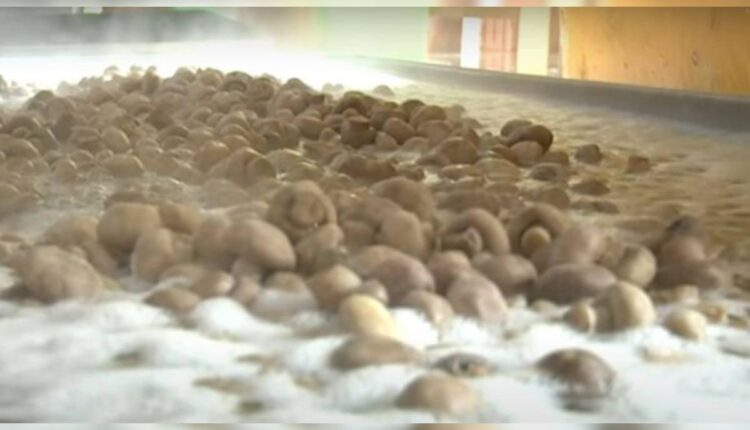Digital Mushroom: Why do young Agri-startups not advised for high-cost investment to start mushroom cultivation?
Without training and thorough knowledge, farmers should not opt for mushroom cultivation.
Digital Mushroom: India has more than 85% small and marginal farmers, who have so little agricultural land that they are unable to support their families throughout the year.
What can be an alternative for the landless and low-land holdings farmers, so that they can get a good income? In recent years, with increased awareness, mushroom cultivation has emerged as a viable option.
Mushroom production in India
Marginal farmers are doing 50 percent of the mushroom production in India, while the remaining 50 percent is produced by industrial institutions. States like Uttar Pradesh, Kerala, and Tripura are the pioneers in mushroom production in India, while with new farmers and agri-start-ups states like Haryana, Madhya Pradesh, Chhattisgarh, Bihar, Rajasthan, and Uttarakhand are emerging gradually. Despite all this, India is able to produce only one percent of the total global mushroom production.
Mushroom cultivation requires low cost, less space, and has good demand in the domestic and international markets. For different climatic conditions, there is a variety of types of mushrooms.
In such a favorable scenario, considering how maximum farmers and entrepreneurs can yield the benefit from mushroom cultivation, ‘Famers of India’ conducted the first-ever, four-hour-long digital mushroom conclave on 28th February 2022. In its first session, young start-ups from various states joined the discussion and the topic was agri- start-ups mushroom.
Satinder Rawat worked in Dubai for 15 years and started the mushroom business after returning to his state Uttarakhand two years ago. Along with him, Sanjeet Kumar, from Uttarakhand, Vikas Vermaof Hisar (Haryana), Rajiv Ranjan of Bihar, and Toshan Singh from Chhattisgarh were the guests of the first session. Toshan Kumar Sinha of Dhamtari (Chhattisgarh)said that his area is famous as a rice bowl, however, he chose mushroom cultivation. Today he is associated with the business of mushroom seeds and about one thousand women farmers are associated with him.
Start mushroom farming on a small scale
According to Vikas Verma, running a mushroom start-up in Hisar (Haryana), the mushroom is a profitable crop and a good option for agri-start-ups as it requires less capital. He suggests that farmers involved in mushrooming should take proper training and then start at a small scale. Sharing his own insights, he accepted that due to his lack of experience and heavy investments he had to bear losses at the initial stage of his business. He recommends that rather than relying on videos on social media platforms farmers should join Krishi Vikas Kendra and get in touch with nearby farmers.
Mushroom production can overcome the problem of migration
After spending 15 years in Dubai, Satinder Rawat returned to his home state Uttarakhand two years ago. Instead of taking leaps, he preferred baby steps and started mushroom cultivation with a HUT. In his view, mushroom cultivation is ‘different’ than ‘difficult’. Thus, his advice is to understand the depth and dimension of the business and then set the process. He suggests that farmers should begin with low capital and at a small- scale. Uttarakhand is a mountainous region with terrace farming. Lack of agricultural land and climatic conditions make it more difficult for the farmers. However, mushroom cultivation can bring numerous benefits and advantages. Moreover, the government also supports this initiative. The success in the mushroom business can contribute to reverse migration in Uttarakhand and solve migration issues.
More awareness is needed of products
Sanjeet Kumar of Uttarakhand says that in 2019 he took training in Himachal Pradesh on mushroom cultivation. The government gives subsidies to young farmers for promoting mushroom cultivation, making the current scenario favorable and beneficial for mushroom agri-business.
Rajeev Ranjan, a mushroom entrepreneur from Bihar, said that the market for mushrooms is developing, however, the growers need more awareness and a little patience. Different varieties of mushrooms do not fetch the same price. The farmers cannot get the same benefits from different varieties, such as buttons and oysters, and should not pin their hopes on instant profits.
In the first session, all the guests put forth the difficulties of their respective areas and the ways to deal with them. By sharing insights into their journey, they also guided new growers and entrepreneurs. In the future, we will continue to organize conclaves on mushroom cultivation. If you have any queries related to mushroom cultivation, production, market, or processing, you can reach out to us on the number given below.
Contact Details –
If farmers want to share any valuable information or experiences related to farming, they can connect with us via phone or WhatsApp at 9599273766 or you can write to us at “kisanofindia.mail@gmail.com”. Through Kisan of India, we will convey your message to the people, because we believe that if the farmers are advanced then the country is happy.

